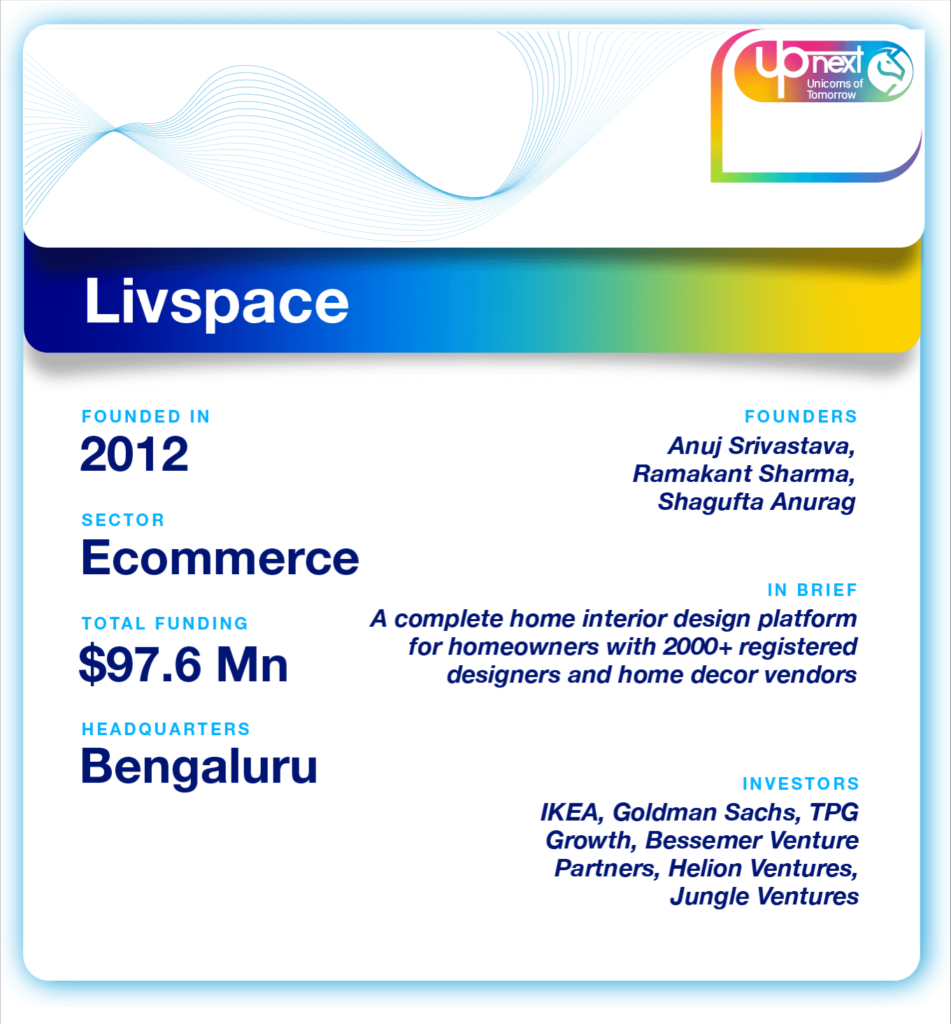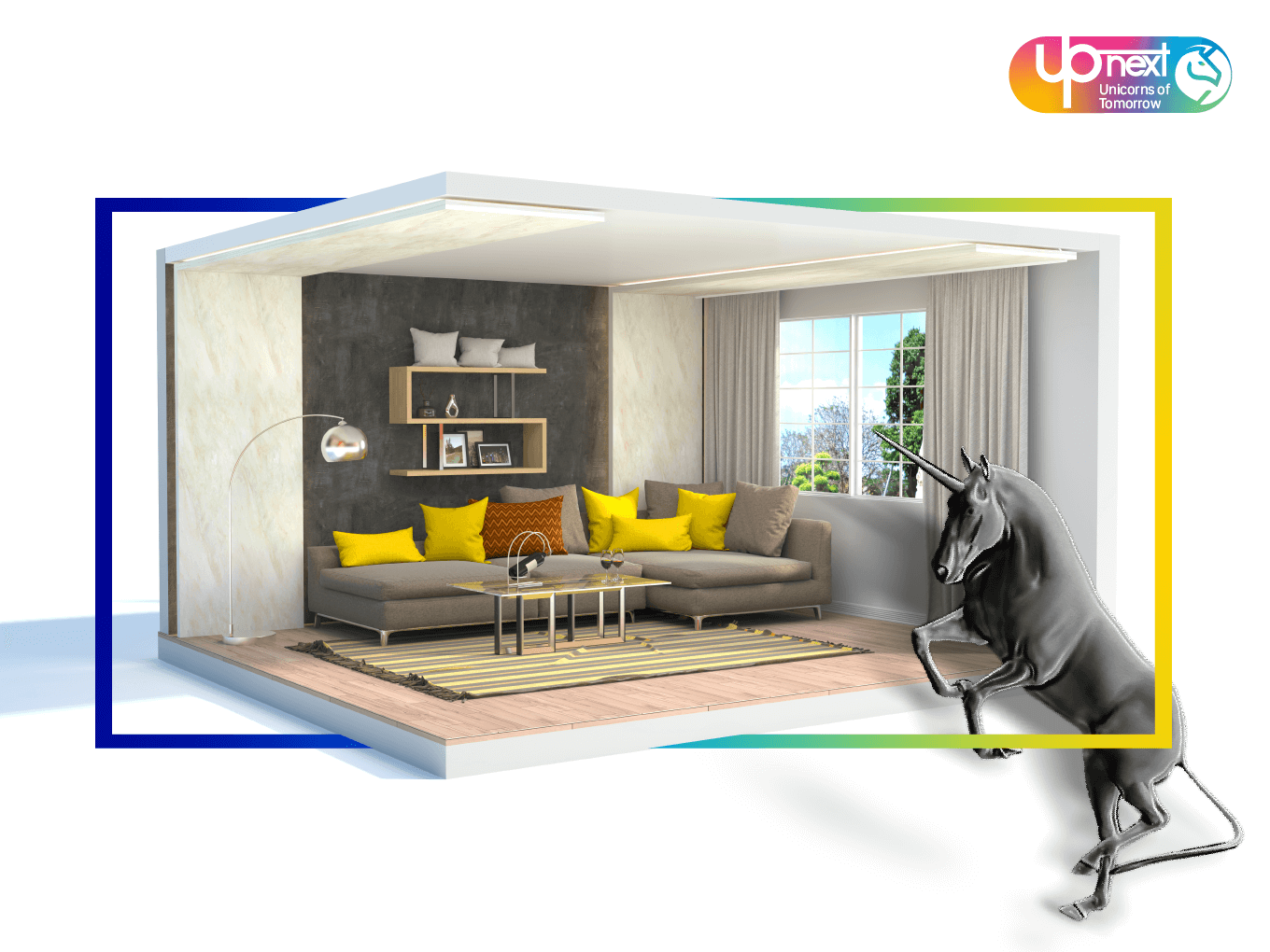SUMMARY
Home decor marketplace Livspace has changed how urban Indians think of home design and decor
CEO Anuj Srivastava says it will hit profitability in many city operations and is looking at Tier 2 expansion
The company also wants to double down on its omnichannel experience with more design studios
To celebrate India’s rising startups, Inc42 is profiling a new soonicorn every Friday in the Inc42 UpNext: Unicorns Of Tomorrow series. For the next few months, we will be speaking to founders and cofounders at these potential unicorns and shining light on their journeys and growth stories. We begin the series with a look at home and interior design platform, Livspace.
Indian homes have never been short on furnishings, furniture or decor options — any typical Indian home has furniture that has been handed down through the generations. Despite this, there was rarely anything flashy inside the typical Indian home. If there was one word to describe the quintessential Indian home design it would be utilitarian.
But as with most things in modern-day India, home decor and interior design are changing dramatically as more and more upwardly-mobile Indians get exposed to new ideas and concepts.
What was once a market which thrived on personal connections with interior designers and handymen has now been opened up thanks to technology bringing the disparate pieces and vendors together. These days that utilitarian approach has been replaced with design ideas borrowed from around the world.
The market for home interiors and renovation in India today is estimated to be between $20 Bn- $30 Bn. Despite that size, unlike the growth of the consumer internet market which has widely disrupted many sub-sectors of the economy, this space is still largely dominated by offline models often led by contractors who act as middlemen.
The entry of global furniture giant Ikea was a watershed moment for India’s young homeowners and aspirational working professionals in urban areas.
India’s Home Design Tastes Mature
Urban millennials in India grew up watching American sitcoms and Indian soaps in the 1990s, and the depictions of protagonists from affluents backgrounds in their fabulous homes have certainly had an influence on how Indians now think of home design. The aspirational quotient among Indian homeowners was driven up with exposure to new designs, new pieces and styles. In stark contrast to the modest designs of Indian homes, new-age abodes have fantastic furniture, art pieces and designer decor.
The wave of home and interior design has inspired many to set up design-centric businesses in India. One such individual is Anuj Srivastava, a former senior executive at Google, where he oversaw the product marketing and growth for the commerce and mobile payments segment in the Bay Area.
Today, Srivastava is revolutionising something altogether different. The founder of Livspace, an online home design startup that he founded with Ramakant Sharma, had earlier had stints with Myntra as VP of engineering and Livspace was the logical next step.
It was clear to Srivastava, who also used to be a very active angel investor in the US, India and Southeast Asia that India was going to have 100-200 unicorns and for him, this was the opportunity to be part of that tale. Livspace aims to be a one-stop-shop for home interior design — whether that is renovations or home design.
In conversation with Inc42, Srivastava said that one of the key goals while setting up Livspace was to be able to take a very complex supply chain, put it on the cloud and create a tech platform to help customer experience their potential purchases “in a very ecommerce kind of way”.
Srivastava claims Livspace’s main competitors are contractors, interior designers and architecture studios and not necessarily online furniture retailers such as Pepperfry or Urban Ladder.
Livspace, he says, can be an enabler for consumers through the entire process of home design – and it’s not about buying disparate pieces and putting them together. This is the key differentiator for the founder, as unlike online furniture retailers who are led by catalogue and are focused on the provision of products, Livspace has taken a more holistic approach.
Livspace currently has over 3500 interior designers and more than 450 vendors on its platform. By connecting these vendors and designers to homeowners, the platform is acting as a marketplace for home design. It charges a commission or margin fee for all transactions, which range from INR 1 Lakh to over INR 50 Lakh.
Livspace Goes Omnichannel

Besides its online platform, the company is going strong in omnichannel efforts with four offline design centres and plans to add two to three more such studios in the next few months. Here consumers can hold and feel the products, and it can be a crucial factor in the furniture and home design category.
“When you go higher up the value order chain, people need to feel and see the commodities. Myntra created product returns but in our industry, we can’t do the same. Urban Ladder tried to do it but the unit economics were horrible,” Srivastava says.
For Srivastava, offline design centres achieve two key things. Firstly, it improves the trust factor in the consumer’s mind, and secondly, it also allows sellers to showcase their products in a better manner, unlike an online catalogue. “We did our first design centre in 2015, and we always knew this was going to be an omnichannel space. We have combined the beauty of online consumption and married with physical shopping,” he adds.
In 2016, Livspace ran an experiment where it compared its Bengaluru business to its Gurugram operations. In its home city of Bengaluru, the company had a design centre, while in Gurgaon it only used the online platform. The results revealed that the conversation rates in Bengaluru were two to three times higher. But Srivastava is quick to add that that does not change the fact that Livspace is primarily an online player.
“98% of our demand still originates from the web. None of our physical centres has PoS centres, so you cannot walk in and buy from there,” Srivastava says.
Money In The Bank
In terms of funding, Livspace raised received a debt fund of INR 12 crore from Trifecta Capital in May last year, and $70 Mn in a funding round led by private equity firm TPG Growth and Goldman Sachs in October with the aim of expanding the reach of these stores and accelerate sales. Earlier this year, it raised funding from Ikea, marking the Swedish company’s first technology investment in India, with Livspace receiving $10 Mn-15Mn million
With average order value ranging between INR 10 Lakh and INR 12 lakh, Livspace’s price points can also go up to INR 50 lakh per order, with smaller ticket orders starting at INR 1 lakh. The pricing is a big factor in the purchase decision is high in value and hence the sell is proportionally difficult.

With a steady stream of resource, Livspace is looking to increase customer conversion rates by using virtual reality headsets at its design studios with which customers can take virtual tours of their homes and check how their furniture purchases will look.
“We have got 50K floor plans on our platform and 2-3 sample designs to go with it. A lot of the times you are doing this is to demonstrate to the customers that you are at the cusp of innovation and it’s true because nobody has done this,” said Srivastava.
Talking about the fundraise and the possibility of raising more funds in the future, Srivastava said that there is enough runway available to “dominate the market” and create appropriate levels of price point variations in the times to come.
“Our margin structure is much better and because of our sales volumes, our working capital needs are well taken care of.”
Livspace — A Unicorn In The Making?
Livspace has grown about 500% in the last 24-27 months, according to Srivastava and the impressive growth has also shown in the margins that the company earns, which he claims have improved from 18% to 40% in the same time.
“Because of both of these outcomes, what is happening is that our cities will start becoming EBITDA positive and they will start contributing money back to the business,” said Srivastava.
But a point of worry for Livspace could be its mounting losses as it burns cash towards expansion, bringing vendors on board and attracting the best talent. Losses incurred by the firm for FY 18 almost doubled from INR 47.75 Cr to INR 94.81 Cr. The losses had soared 5X in FY17 to INR 47.7 Cr, making the growth in FY18 far more controlled than before. But it still could be a cause for worry, even though it’s something Srivastava is unfazed by.
“Should we want to, we can become profitable but sometimes when you are building this kind of company, you are almost like an infrastructure company which requires more money being put back into the business,” he says.
The company quite clearly has ambitions to enter international markets as well, and it’s not something that Srivastava has shied away from speaking about. For now, though, he wants to focus on India where the company plans to expand to 13-14 metro areas this year.
“Hyderabad, Pune and Chennai are growing faster in the first 6-9 months compared to Bengaluru,” says Srivastava, who also indicated going after cities in the future that are not necessarily in Tier 1 category, but which have a sizeable chunk of new internet users and a more aspirational audience with larger disposable incomes.
Livspace target group includes couples who are in their 30s-40s, working professionals who have bought a new home or have existing homes with property values ranging between INR 40 lakhs and INR 4 Cr.
Currently, the startup is estimated to be valued between $250 Mn – $300 Mn and if it continues to carry forward its growth momentum, it may well achieve the tag of a unicorn in the not so distant future. But meanwhile, it has to contend with the sluggish Indian economy and dropping consumption along with managing its costs. All of these aspects are crucial for the long-term fortunes of Livspace, and given the lack of direct competition in this space for the company, how it deals with these hurdles could well define the home design and interiors category.



























